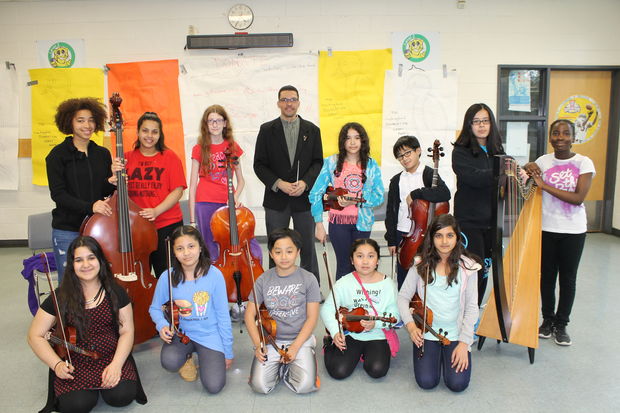DNAInfo published this story on June 2, 2017:
WEST RIDGE — For the last few years, a rare after-school program at Clinton Elementary School in West Ridge has become so popular most students have been put on a waitlist.
The small club centers around a unique pastime: playing the harp.
“To people who maybe have never actually seen or heard it performed live, it’s a thrill,” said Robert Turner, a language and music teacher at the school, who is also the principal harp player for the Northwest Chicago Symphony. “And the instrument itself is a work of art, a lot of people don’t realize that until they come up close.”
For the last four years, Turner has taught two of his students, both girls, how to differentiate between the instrument’s multi-colored strings and how to coordinate between two hands as to pluck them in a way they emanate the harp’s angelic sound.
Ange-Marie Nifasha, one of the fifth-grade harpists, said in an essay she wrote about why she plays the instrument is that the harp “can help me be a better and creative person.”
She said though she enjoys being able to experiment with creating her own songs, one of her favorite pieces is the William Tell Overture by Gioachino Rossini.
Nifasha, a native of Tanzania, said she hopes to continue learning to perfect the harp through her college years and beyond — even offering to happily “go out in the streets to play.”
“And when it becomes popular, I can perform it in front of many people,” she said.
Those two are only a fraction of the students who have shown interest in learning to play the harp over the years, but Turner said cost is a burdening factor when it comes to accessing the instrument.
He pays out of his pocket the cost to rent the two harps his students use.
“The kids love it,” Turner said. “It just pulls them in, it pulls them in. And I really hate to have to tell a student we don’t have an instrument that they can learn on if they’re really interested.”
Beginner harps start around $700 and small folk harps go for about $2,500 each, while the two pedal harps that his two long-time students need run between $10,000-15,000 each — used — he said.
Turner was recently awarded a $5,000 grant from the Mockingbird Foundation to purchase some entry-level harps to begin expanding the club, but he still needs about $13,000 to cover the cost of a used pedal harp so his current students can advance.
In order to do that, Turner is attempting to raise an additional $60,000 via a GoFundMe campaign, which outlines a list of instruments and equipment he hopes to gain for his music students, including 11-12 harps.
The money will not only alleviate the teacher’s financial responsibility to continue renting the club’s current pair of harps, but will also go toward the school’s extracurricular orchestra program, which is sponsored by a grant that will end soon.
 Robert Turner, a teacher and orchestra director at Clinton Elementary in West Ridge, wants to keep and expand his school’s orchestra and harp programs. [Provided/Robert Turner]
Robert Turner, a teacher and orchestra director at Clinton Elementary in West Ridge, wants to keep and expand his school’s orchestra and harp programs. [Provided/Robert Turner]
Turner’s harp program grew out of a multi-year partnership between Chicago Public Schools and the Chicago Symphony Orchestra’s Negaunee Music Institute, which provided in-class performances, tickets and transportation for symphony shows, instruction and more.
His orchestra consists of about 12 students between third through sixth-grade who meet once a week after school to rehearse and attempt to perform everything from classical pieces, to Spanish arrangements, pop and more.
While only a handful of elementary schools have been selected to take part in the orchestral program, even fewer have an in-house professional harpist, like Turner, hoping to pull some strings to get his harp-specific club off the ground.
“I’m on a mission to save the orchestral programs for the public schools,” he said.
A skilled musician since middle school and harpist for the last 20 years, Turner said he not only sees the critical thinking, collaboration, self-discipline, cultural exploration and fun his students experience during practice, but he first learned to play musical instruments while in middle school himself.
He hopes more schools adopt elementary and middle school-based orchestral programs in order to introduce both musical and life skills to students at a younger age so they have more experience by the time they reach high school — if they have any experience at all.
One way to do that is to build bridges between local schools’ music departments, as Turner is doing with nearby Mather High School, he said.
Recently accepted into the Illinois Institute of Technology’s VanderCook College of Music Summer Graduate Residency Program, Turner wants to give students more opportunities to realize music can be life-changing.
“My start was in elementary school, and I realized that for a broad range of students this is the only exposure to instrumental music they may have,” Turner said. “So it’s very important that I try to give back and I try to them instill in them the value of studying an instrument, in how it can be an enrichment to their lives.”
